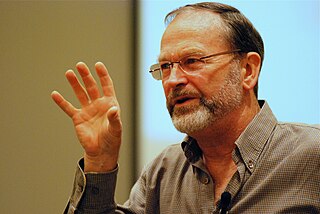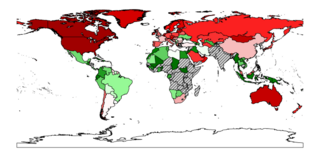
Ecological economics, bioeconomics, ecolonomy, eco-economics, or ecol-econ is both a transdisciplinary and an interdisciplinary field of academic research addressing the interdependence and coevolution of human economies and natural ecosystems, both intertemporally and spatially. By treating the economy as a subsystem of Earth's larger ecosystem, and by emphasizing the preservation of natural capital, the field of ecological economics is differentiated from environmental economics, which is the mainstream economic analysis of the environment. One survey of German economists found that ecological and environmental economics are different schools of economic thought, with ecological economists emphasizing strong sustainability and rejecting the proposition that physical (human-made) capital can substitute for natural capital.
Overconsumption describes a situation where a consumer overuses their available goods and services to where they can't, or don't want to, replenish or reuse them. In microeconomics, this may be described as the point where the marginal cost of a consumer is greater than their marginal utility. The term overconsumption is quite controversial in use and does not necessarily have a single unifying definition. When used to refer to natural resources to the point where the environment is negatively affected, it is synonymous with the term overexploitation. However, when used in the broader economic sense, overconsumption can refer to all types of goods and services, including manmade ones, e.g. "the overconsumption of alcohol can lead to alcohol poisoning". Overconsumption is driven by several factors of the current global economy, including forces like consumerism, planned obsolescence, economic materialism, and other unsustainable business models and can be contrasted with sustainable consumption.
The ecological footprint measures human demand on natural capital, i.e. the quantity of nature it takes to support people and their economies. It tracks human demand on nature through an ecological accounting system. The accounts contrast the biologically productive area people use to satisfy their consumption to the biologically productive area available within a region, nation, or the world (biocapacity). Biocapacity is the productive area that can regenerate what people demand from nature. Therefore, the metric is a measure of human impact on the environment. As Ecological Footprint accounts measure to what extent human activities operate within the means of our planet, they are a central metric for sustainability.
David Courtney Boyle is a British author and journalist who writes mainly about history and new ideas in economics, money, business, and culture. He lives in Steyning in West Sussex. He conducted an independent review for the Treasury and the Cabinet Office on public demand for choice in public services which reported in 2013. He is co-founder and policy director of Radix, which he characterized in 2017 as a radical centrist think tank. He is also co-director of the mutual think tank New Weather Institute.

A steady-state economy is an economy made up of a constant stock of physical wealth (capital) and a constant population size. In effect, such an economy does not grow in the course of time. The term usually refers to the national economy of a particular country, but it is also applicable to the economic system of a city, a region, or the entire world. Early in the history of economic thought, classical economist Adam Smith of the 18th century developed the concept of a stationary state of an economy: Smith believed that any national economy in the world would sooner or later settle in a final state of stationarity.

The New Economics Foundation (NEF) is a British think-tank that promotes "social, economic and environmental justice".

William Rees, FRSC, is Professor Emeritus at the University of British Columbia and former director of the School of Community and Regional Planning (SCARP) at UBC.

Ecological debt refers to the accumulated debt seen by some campaigners as owed by the Global North to Global South countries, due to the net sum of historical environmental injustice, especially through resource exploitation, habitat degradation, and pollution by waste discharge. The concept was coined by Global Southerner non-governmental organizations in the 1990s and its definition has varied over the years, in several attempts of greater specification.

Ann Pettifor is a British economist who advises governments and organisations. She has published several books. Her work focuses on the global financial system, sovereign debt restructuring, international finance and sustainable development. Pettifor is best known for correctly predicting the financial crisis of 2007–08. She was one of the leaders of the Jubilee 2000 debt cancellation campaign.
Simon Zadek is a writer and advisor focused on business and sustainability. He is the Co-Director of the UNEP Inquiry into the Design of a Sustainable Financial System.
Degrowth is an academic and social movement critical of the concept of growth in gross domestic product as a measure of human and economic development. Degrowth theory is based on ideas and research from a multitude of disciplines such as economics, economic anthropology, ecological economics, environmental sciences, and development studies. It argues that the unitary focus of modern capitalism on growth, in terms of the monetary value of aggregate goods and services, causes widespread ecological damage and is not necessary for the further increase of human living standards. Degrowth theory has been met with both academic acclaim and considerable criticism.
"A Green New Deal" was a report released in the United Kingdom on 21 July 2008 by the Green New Deal Group and published by the New Economics Foundation, which outlines a series of policy proposals to tackle global warming, the current financial crisis, and peak oil. The report calls for the re-regulation of finance and taxation, and major government investment in renewable energy sources. Its full title is: A Green New Deal: Joined-up policies to solve the triple crunch of the credit crisis, climate change and high oil prices.
In environmental science, a population "overshoots" its local carrying capacity — the capacity of the biome to feed and sustain that population — when that population has not only begun to outstrip its food supply in excess of regeneration, but actually shot past that point, setting up a potentially catastrophic crash of that feeder population once its food populations have been consumed completely. Overshoot can apply to human overpopulation as well as other animal populations: any life-form that consumes others to sustain itself.

Earth Overshoot Day (EOD) is the calculated illustrative calendar date on which humanity's resource consumption for the year exceeds Earth’s capacity to regenerate those resources that year. The term "overshoot" represents the level by which human population's demand overshoots the sustainable amount of biological resources regenerated on Earth. When viewed through an economic perspective, the annual EOD represents the day by which the planet's annual regenerative budget is spent, and humanity enters environmental deficit spending. EOD is calculated by dividing the world biocapacity, by the world ecological footprint, and multiplying by 365, the number of days in a year:

The Global Footprint Network was founded in 2003 and is an independent think tank originally based in the United States, Belgium and Switzerland. It was established as a charitable not-for-profit organization in each of those three countries. Its aim is to develop and promote tools for advancing sustainability, including the ecological footprint and biocapacity, which measure the amount of resources we use and how much we have. These tools aim at bringing ecological limits to the center of decision-making.

Tim Jackson is a British ecological economist and professor of sustainable development at the University of Surrey. He is the director of the Centre for the Understanding of Sustainable Prosperity (CUSP), a multi-disciplinary, international research consortium which aims to understand the economic, social and political dimensions of sustainable prosperity. Tim Jackson is the author of Prosperity Without Growth and Material Concerns (1996). In 2016, he received the Hillary Laureate for exceptional mid-career Leadership. His most recent book Post Growth—Life After Capitalism was published in March 2021 by Polity Press.

The New Economy Coalition (NEC) is an American nonprofit organization based in Boston, Massachusetts, formerly known as the New Economics Institute. It is a network of over 200 organizations based in the US and Canada working for "a future where people, communities, and ecosystems thrive...where capital is a tool of the people, not the other way around" as part of what it describes as the New Economy movement.
Neva Goodwin Rockefeller is an American businesswoman. She's served as co-director of the Global Development And Environment Institute (GDAE) at Tufts University since 1993, where she is a research associate at the Fletcher School of Law and Diplomacy and director of the Social Science Library: Frontier Thinking in Sustainable Development and Human Well-Being.

The Doughnut, or Doughnut economics, is a visual framework for sustainable development – shaped like a doughnut or lifebelt – combining the concept of planetary boundaries with the complementary concept of social boundaries. The name derives from the shape of the diagram, i.e. a disc with a hole in the middle. The centre hole of the model depicts the proportion of people that lack access to life's essentials while the crust represents the ecological ceilings that life depends on and must not be overshot. The diagram was developed by University of Oxford economist Kate Raworth in her 2012 Oxfam paper A Safe and Just Space for Humanity and elaborated upon in her 2017 book Doughnut Economics: Seven Ways to Think Like a 21st-Century Economist and paper.

Ecological overshoot is the phenomenon which occurs when the demands made on a natural ecosystem exceed its regenerative capacity. Global ecological overshoot occurs when the demands made by humanity exceed what the biosphere of Earth can provide through its capacity for renewal.











